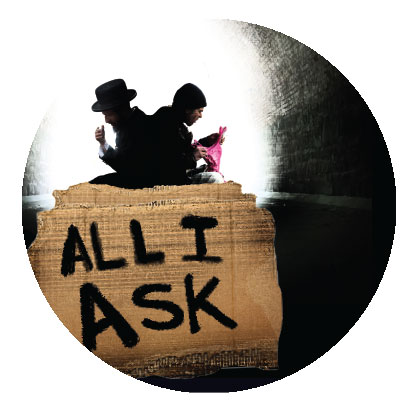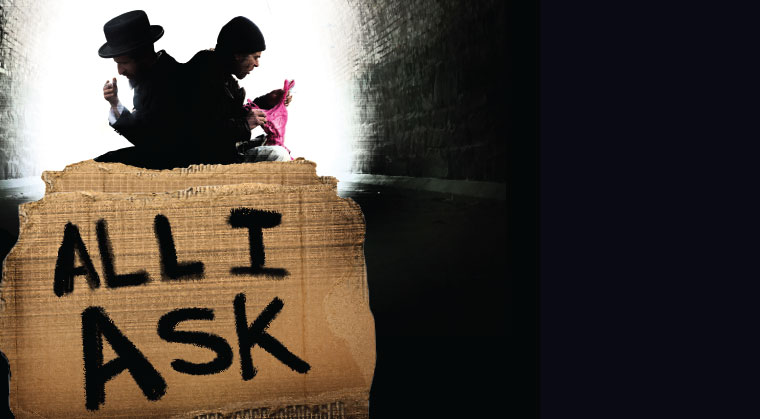All I Ask: Chapter 4


B
ugi sat at the edge of the road, rubbing his sore limbs. They hurt him so much, he barely noticed the oncoming truck. He jumped up just in time. “Look what happens when you go poking your nose into places where you’re not wanted,” Lulu chided him. “You get thrown out like a stray dog. This is for you, by the way.”
“How did you get this?” Bugi gazed, enraptured, at the glossy brochure Lulu handed him.
“The receptionist from the hotel — the one you were talking to before — tossed it to me when he saw them dragging you away. He must have guessed that I know you.”
“He was a good guy, that receptionist,” Bugi said hoarsely, still under the spell of the luxury he’d seen, still feeling the sting of humiliation at being thrown out. “It’s a shame that G-d divided the world up into respectable and unrespectable people, instead of good people and bad people.”
“G-d didn’t divide people up,” Lulu said. “He just created them. They divide themselves up.”
Together, they fixed their eyes on the brochure. Images of understated opulence peeked out at them: tantalizing, neutral-toned rooms, glittering corridors, and a spacious lobby with a grand piano. You could almost hear a sonata wafting over the Moorish armchairs and marshmallow-soft sofas.
“Eizeh yofi.” Bugi sighed. “I want to be there, Lulu.”
“Do you really?” The aging beggar beside him had an unusual glint in his eye.
“Yes, really.”
“Well, I can help you, then.” Lulu took hold of his arm. “We’ve talked about this a thousand times, Bugi, but you never really meant it.”
“Because I didn’t have the koach. I didn’t know how to start.”
“Musa says once a beggar, always a beggar, but it’s not true. I know it’s not true. I’m telling you, Bugi, if you really want to get out of this, you will. I’ll get you out.”
“You’ll come with me?”
“No. I’m too old.”
“What if I won’t go without you?”
“Then you can stay where you are. Don’t try to manipulate me.”
“All right, then.” Bugi looked down at the brochure and solemnly said, “A year from now — do you hear me, Lulu? Do you hear me, world? A year from now, I’ll come back to this hotel like a king. That doorman in the lavender shirt will bow when he sees me coming. I’ll give a nice tip to that Yossi from the reception desk. A year from now, I’ll be a normal person, with a bank account and a kupat cholim card — even though I hate banks, and I hate the healthcare system.”
“I’ve got 2,000 shekels in the dirah,” Lulu murmured. “If you really mean it, I’ll give you that money.”
The “dirah” was their squatting quarters in one of the crumbling, abandoned buildings across from the central bus station. The city had sealed off the entrance, which was a good thing as it helped keep the homeless from freezing at night. Getting in and out was no problem; they were experts at finding openings the city had overlooked — or creating them.
(Excerpted from Mishpacha, Issue 760)
Oops! We could not locate your form.


